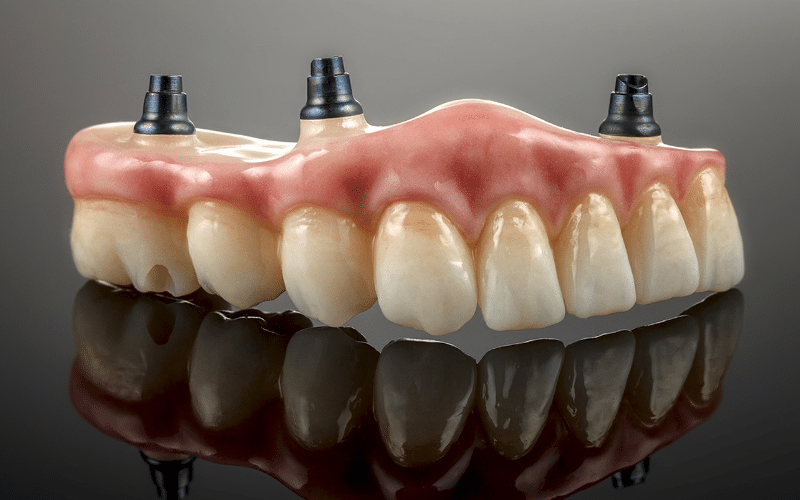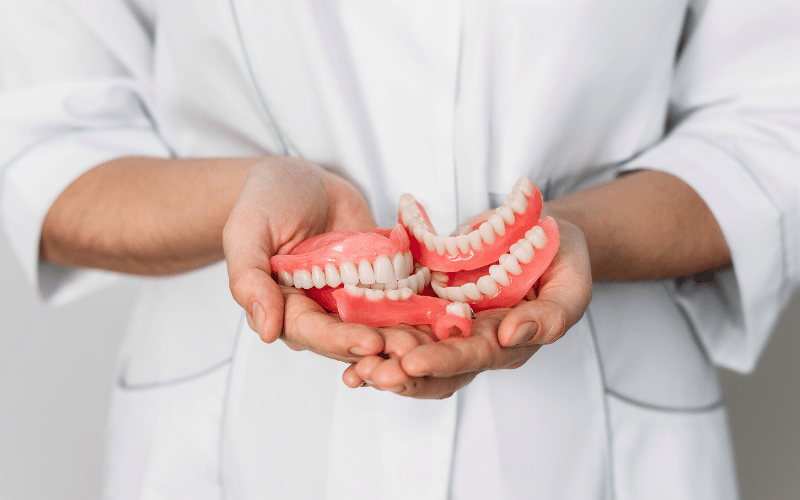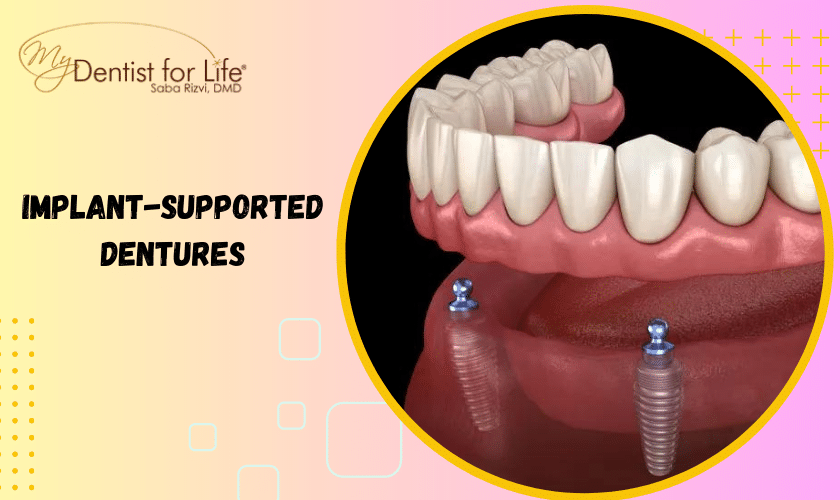ONLINE SCHEDULING AND VIRTUAL CONSULTS AVAILABLE

Custom Comfort: Finding the Right Fit for Your Dentures

In the realm of dental prosthetics, dentures play a vital role in restoring not just smiles but also functionality and confidence. Whether due to age, injury, or oral health issues, many individuals rely on dentures to regain the ability to eat, speak, and smile comfortably. These custom-made dental appliances offer a lifelike replacement for missing teeth, providing both aesthetic appeal and practical utility.
Finding the right fit for full or partial dentures is paramount to ensure optimal comfort and functionality. A well-fitted denture can significantly enhance a person’s quality of life, allowing them to enjoy their favorite foods, engage in social interactions without hesitation, and maintain overall oral health.
In this blog, we will delve into the various types of dentures available, explore the benefits of custom-fitted dentures, elucidate the denture fitting process, discuss proper care and maintenance, and provide practical tips for adjusting to new dentures. Join us on this journey to discover how custom comfort can transform your smile and restore your confidence.
Types of Dentures
Dentures come in various forms, each designed to address specific dental needs and preferences. Understanding the different types of dentures can help individuals make informed decisions about their dental prosthetics.
Complete Dentures
Complete dentures are used when all natural teeth are missing in either the upper or lower jaw. These dentures are custom-made to fit the shape of the gums and jawbone, providing a full set of replacement teeth. Complete dentures can significantly improve chewing ability, speech clarity, and facial aesthetics, restoring confidence and quality of life for individuals missing all their teeth.
Partial Dentures
Partial dentures are recommended when some natural teeth remain in the mouth. They consist of replacement teeth attached to a pink or gum-colored base that blends with the natural gum tissue. Partial dentures are secured in place using clasps or other attachments, providing stability and functionality while filling in gaps caused by missing teeth. These dentures not only enhance oral aesthetics but also prevent the remaining teeth from shifting out of position.
Implant-supported Dentures
Implant-supported dentures offer the highest level of stability and functionality among denture options. They are anchored to dental implants surgically placed in the jawbone, providing a secure and permanent solution for missing teeth. Implant-supported dentures offer improved chewing efficiency, speech clarity, and comfort compared to traditional dentures. Additionally, they help preserve jawbone density and prevent bone loss, promoting long-term oral health.
The Denture Fitting Process
Achieving a comfortable and precise fit is crucial for the success of dentures. The fitting process typically involves several steps, ensuring that the dentures are tailored to meet the unique needs and preferences of each individual.
- The journey towards well-fitting dentures begins with an initial consultation with a dentist. During this appointment, the dentist will conduct a comprehensive examination of the mouth and discuss the patient’s dental history, concerns, and goals. This consultation provides an opportunity for the dentist to assess the patient’s oral health and determine the most suitable denture option.
- Following the consultation, the dentist will proceed with taking impressions and measurements of the patient’s mouth. These impressions serve as the blueprint for crafting custom dentures that fit snugly and comfortably. The dentist will use specialized materials to capture the precise shape and size of the oral structures, ensuring an accurate fit for the dentures.
- Once the impressions are taken, the next step involves trial fittings and adjustments. During this stage, the patient will try on the dentures to assess their fit, comfort, and appearance. The dentist will make any necessary adjustments to ensure optimal fit and function. This may involve refining the shape, size, or alignment of the dentures to achieve a natural and comfortable fit. Multiple trial fittings may be conducted until both the patient and the dentist are satisfied with the fit and aesthetics of the dentures. Regular follow-up appointments may be scheduled to monitor the patient’s adaptation to the dentures and address any concerns or discomforts that may arise.
Benefits of Custom-Fitted Dentures
Custom-fitted dentures offer a range of benefits that contribute to overall oral health and quality of life. These personalized prosthetics provide a comfortable and secure fit, allowing individuals to eat, speak, and smile with confidence.
- One of the primary benefits of custom-fitted dentures is improved comfort and fit. Unlike generic, one-size-fits-all dentures, custom-fitted dentures are crafted to match the unique contours of the individual’s mouth. This tailored approach ensures a snug and secure fit, minimizing the risk of discomfort, irritation, or slippage commonly associated with ill-fitting dentures.
- Enhanced chewing and speech are also notable advantages of custom-fitted dentures. By providing a stable and properly aligned bite, these dentures enable individuals to chew a wider variety of foods with ease and efficiency. Additionally, the precise fit of custom dentures helps maintain proper tongue and lip positioning, facilitating clear and natural speech.
- Custom-fitted dentures play a crucial role in preventing bone loss and facial changes that can occur following tooth loss. When teeth are missing, the underlying jawbone may begin to deteriorate over time, leading to a sunken facial appearance and compromised oral function. Custom dentures help support the underlying bone structure, preserving facial contours and preventing further bone resorption. This not only maintains facial aesthetics but also promotes long-term oral health and function.
Caring for Custom Dentures
Proper care and maintenance are essential for prolonging the lifespan and effectiveness of custom dentures. By following a regular cleaning routine and attending scheduled dental check-ups, individuals can ensure the longevity and functionality of their prosthetic teeth.
- To maintain optimal oral hygiene, it’s important to establish a thorough cleaning routine for custom dentures. This includes brushing the dentures daily with a soft-bristled brush and non-abrasive denture cleaner to remove food particles, plaque, and bacteria. Additionally, soaking the dentures in a denture-cleansing solution overnight can help disinfect and refresh them for daily use.
- Regular dental check-ups are crucial for monitoring the fit and condition of custom dentures. Dentists can perform adjustments or repairs as needed to address any issues with fit, comfort, or functionality. These check-ups also provide an opportunity for dentists to assess the overall oral health of individuals wearing dentures and identify any potential concerns early on.
- Avoiding common denture-related problems is key to maintaining the integrity and effectiveness of custom dentures. Individuals should refrain from using abrasive cleaning agents or hot water, as these can damage the denture material. Additionally, avoiding hard or sticky foods can help prevent denture breakage or dislodgement. By following these care guidelines, individuals can enjoy long-lasting benefits from their custom dentures.
Adjusting to New Dentures
Adapting to new dentures may require some time and patience as individuals acclimate to the prosthetic teeth. Understanding the initial discomfort and implementing strategies for overcoming challenges can help facilitate a smoother transition and maximize the long-term benefits of custom dentures.
Initial Discomfort and Adaptation Period
It’s common to experience initial discomfort or soreness when wearing new dentures. This adjustment period may involve increased salivation, altered speech, or minor irritation of the gums. However, these symptoms typically subside as the mouth adjusts to the presence of the dentures.
Tips for Overcoming Challenges
To ease the transition, individuals can:
- Gradually increase the duration of wear and practice speaking and eating with the dentures in place.
- Using a denture adhesive may also provide additional stability and comfort during the adaptation period.
- Seeking support from family, friends, or a dentist can offer reassurance and guidance throughout the adjustment process.
Long-term Benefits of Custom Dentures
Despite the initial challenges, custom dentures offer significant long-term benefits, including:
- Restored chewing function
- Improved speech clarity
- Enhanced confidence in social interactions.
As individuals become accustomed to wearing their custom dentures, they can enjoy a higher quality of life and greater freedom to smile, laugh, and enjoy their favorite foods with ease.
Opting for custom-fitted dentures offers numerous advantages, from improved comfort and functionality to enhanced oral health and confidence. By following proper care routines and seeking professional adjustments as needed, individuals can enjoy the benefits of their full or partial dentures for years to come. With customized solutions tailored to individual needs, custom dentures empower individuals to reclaim their smiles and embrace a fulfilling life with renewed confidence and comfort.





